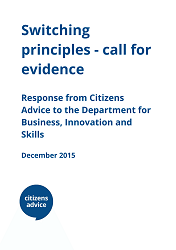Response from Citizens Advice to BIS call for evidence on switching principles
 Over the past decade improving the quantity and quality of consumer switching in regulated markets has been a core aim of consumer and competition policy in the UK. Without highly engaged consumers, who actively search out the best deals and are willing to vote with their feet the rational economic model which underpins consumer policy in this country falls flat.
Over the past decade improving the quantity and quality of consumer switching in regulated markets has been a core aim of consumer and competition policy in the UK. Without highly engaged consumers, who actively search out the best deals and are willing to vote with their feet the rational economic model which underpins consumer policy in this country falls flat.
The government and sector regulators have designed and rolled out numerous initiatives to promote switching, including consumer education campaigns and regulatory interventions to make switching processes more streamlined and consumer friendly. However, switching rates remain stubbornly low. In 2013 year only 12 per cent of the population switched their electricity supplier, 11per cent changed their mobile phone provider and 5 per cent switched their bank account.
So why aren’t people switching? Extensive consumer research has identified a multitude of reasons people tend not to switch in regulated markets, ranging from structural barriers to a lack of motivation. The way in which these barriers manifest themselves, and the extent to which they contribute to consumer inertia, inevitably varies from market to market.
However, in our experience, they are present in some form and to some extent across all regulated markets. We therefore strongly support this BIS initiative to develop a set of switching principles which can be applied across the regulated markets. These principles provide a valuable opportunity to benchmark across markets, share good practice and turn the spotlight on those markets which are falling behind.
The Citizens Advice service has extensive experience of helping people to navigate switching processes and resolve the problems they encounter while switching. In 2014-15 our network of local Citizens Advice offices helped people with more than 6,000 enquiries about selling methods and switching in the utilities and communications markets alone. Our advisers also deliver consumer education programs designed to encourage and support low income consumers to save money by switching their energy tariff and reducing their energy consumption.
Our advisers supported more than 9,000 people in this way through the Energy Best Deal programme in 2014-15. A further 6,000 people received more intensive one to one support through the Energy Best Deal Extra project. This practical experience, alongside the insight we have gained through extensive consumer research, means we are uniquely placed to provide expert analysis and comment in this area.
Our response to the call for evidence [ 0.51 mb] on these principles is divided into three sections. In section one we consider the principles in the round, setting out three challenging tests the principles should aspire to meet. In section two we turn to each of the principles in turn - first exploring the available evidence on the switching barrier the principle aims to address, then providing feedback on the principle itself.
Finally, in section three we put forward the case for the inclusion of a seventh principle which addresses issues of transparency and clarity arising from overly complex product design and misleading advertising.

